II. 1. WHITE DANCE TUNES
[This is an awesome collection of dance tunes, one (Bonyparte also known as Boneparte's Retreat) has had a huge impact on American music. [Listen: W. M. Stepp's famous version 1936]. I did a solo version as a tribute to my friend Doc Watson (based on Merle Watson's recording) and it appeared in my Mel Bay book, American Fiddle Tunes. [Listen: Richard Matteson- Solo Guitar] The tune is different than Stepp's and closer to the standard Boneparte's Retreat version that was a hit song Pee Wee King and Redd Stewart and became a top-ten country hit in 1964. Here's some info on Stepp's tune:
According to Wiki: "Continuing his string of successes, in 1942 Copland composed the ballet Rodeo, a tale of a ranch wedding, written around the same time as Lincoln Portrait. Rodeo is another enduring composition for Copland and contains many recognizable folk tunes, well-blended with Copland's original music. Notable in the final movement, is the striking "Hoedown". This was a recreation of Appalachian fiddler W. M. Stepp's version of the square-dance tune "Bonypart" ("Bonapart's Retreat"), which had been transcribed for piano by Ruth Crawford Seeger and published in Alan Lomax and Seeger's book, Our Singing Country (1941). For the "Hoedown" in Rodeo Copland borrowed note for note from Seeger's piano transcription of Stepp's tune. This fragment (lifted from Ruth Crawford Seeger) is now one of the best-known compositions by any American composer, having been used numerous times in movies and on television, including commercials for the American beef industry."
Another tune- Luther Strong's "Callahan" [Listen: Luther Strong- Last of Callahan] is covered in Wilgus' excellent article "The Hanged Fiddler" (see my articles section for an in-depth look at this fiddle tune and song). -Richard Matteson 2011]
CONTENTS: II. 1. White Dance Tunes
Bonyparte
Callahan
Hop Up, My Ladies
Ducks in the Millpond
Lynchburg Town
Jinny Git Around
King William Was King George's Son
Had a Little Fight in Mexico
The Bank of the Arkansaw
II. 1. WHITE DANCE TUNES
Breakdown tunes and square dances have experienced a spectacular revival in the last ten years in the United States. They have furnished a ground upon which the whole population—American and recent American, old and young, rural and metropolitan—could meet on a common basis of recreational activity. As rural workers moved into the cities, barn dances have appeared on the radio and old-time sets have been called between fox-trots in beer parlors and dance halls. Middle-class people in the cities flock to square-dance classes and turn out in thousands to watch the dancing at folk festivals in every part of the country. Here first and second generation immigrants see something that they can immediately understand and participate in, since their own folk dances are not too different in design from those of rural America.
That there existed, on the other hand, a deep-seated Protestant prejudice against square-dancing is testified by Aunt Molly Jackson:
"When I was nine years old and we. lived in East Bumstead, Kentucky, at a little coal-mining camp named Queen City; these Spivey children they wanted me to come and stay all night with them on Christmas Eve night because they was goin' to get enough together to have a square dance and a party of just children. So Charlie Spivey he come out to the house and said to my stepmother; 'Aunt Lizzy beth, can't Molly go an' stay all night with us—it's Christmas Eve night?'
"And she said, 'You'll have to go out to the commissary and ask her father' So he went and asked my father, and my father said, 'No, she can't go? And they come back and told a story, said my father had said 'yes, I could go.' So I went up and dressed and went to stay all night with the Spivey children; and when my father come home that night I was mis sin' and the dance was on, and I was a-dancin' in the dance. But I didn't know that I was dancin'; I thought it was a play we was a-playin' called 'Swing Your Partner.' They knowed that if they told me it was a dance that they was a-dancin' that I'd be afraid, so I wouldn't dance it. So John Spivey he was a-pickin' the banjo, he was the oldest one, he was fourteen, he was singin', callin' the sets. In the square dance back in them times they said,
"Flies in the buttermilk—shoo, fly, shoo;
Gone again, skip to my Lou!
And just as my father come in the door they called that part of the set. Well, he reached and got me by the back of my neck and he went to peckin' me in the head with his fist and said, 'Gone again, skip to my Lou, my dar-lin',' and he carried me clean home that way. So then all the kids, ever' time they see me come out in the yard, they'd scream, 'Gone again, skip to my Lou,' and they kept me housed up for a month or more thataway, for shame. They was teasin' me about the way my old man had hauled me out of the first dance I had ever went to, and I never went to another dance itb my life until I was a married woman. I didn't even know how to dance till after I was married, and then when Jim Stewart and I was married we always attended every barn dance.
"At first when I begin to go with them to dances, just to keep from stay in' at home by myself, I would be what they call a wallflower. I'd watch the rest dance, but I wouldn't dance, because it was agin my father's will and I was afraid he'd find it out; and I knowed he'd always said that if he'd find out a child of his was goin' to a dance, if they was married or forty years old, he'd whip 'em the same. But I delighted in it, and after a while I begin to take chances; and after that Jim Stewart, my husband, and myself we went a lot to private dances. He learned me all the different steps he danced, which was thirty-nine different steps—Pigeon Wing, Railroad, Back Step, Double Shuffle, Mustard Top, the Hound Dog, and a whole lot of others I've forgot. My husband he beat music down with steel knittin' needles on the strings and this makes very beautiful music. His family was all musicians and dancers, every one of 'em,- his sister—and she was a large heavy woman {she wore a number seven shoe and she weighed from 185 to 190 pounds)—she was noted to be the best dancer that attended the square dances in those days."
BONYPARTE
No. 1568. W. M. Stepp, Salyersville, Ky., 1937. Known sometimes as "Bonaparte's Retreat Across the Rocky Mountains." The piece is descriptive—marching, wind howling, etc. [Listen: W. M. Stepp's famous version 1936].
"Did you ever read the history of Napoleon the Bonyparte? It must have been a few hundred years or so ago, I couldn't tell you. He was a great warrior, and I tell you what he used to do. If some country like Germany would try to take some poor little country that was defenseless and make 'em do as they wanted 'em to do—you know, work for 'em and all that— well, he'd go and he'd fight for that country, and he'd lick Germany. He had a army of his own, you know. And that country would pay him, and Germany also would have to pay him for his expenses. His army was located in France. He was a Frenchman—not the King of France, he went out for himself. That's all he ever done, was just watchin' countries and makin' his money that way."
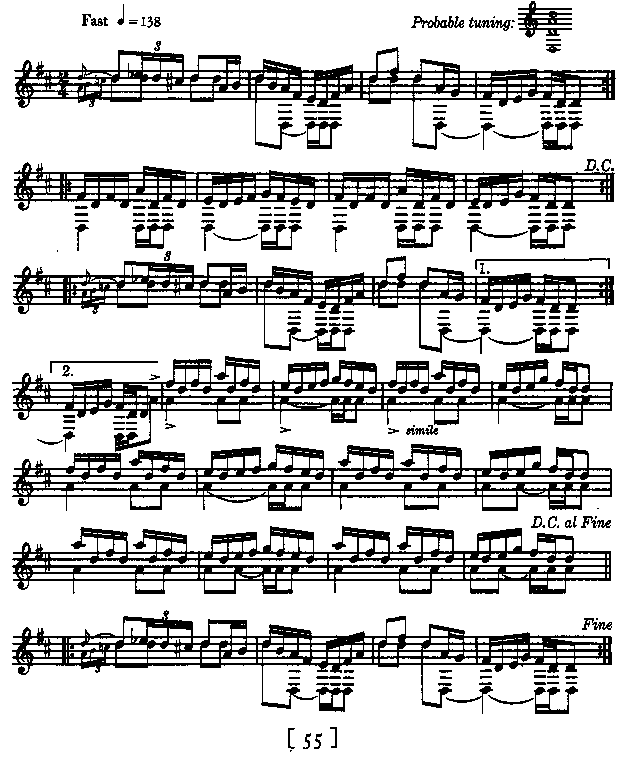
--------------------------------------------------------------------------
CALLAHAN
No. 1537. Luther Strong, Hazard, Ky., 1937. [Listen: Luther Strong- Last of Callahan]
"I learned 'Callahan' from one of them Jackson County fellows flaying the fiddle and singing it. I used to hear an old man by the name of Bob Lehr play it and sing it in Jackson County. This many Callahany he killed somebody. This old man seen him hung, this man Bob Lehr did.
"Tell you what he didy this Callahan. He was a fiddlery and when they was about to hang himy he took his fiddle and he offered anybody, any fiddler that would come up there and sit down with him and play that tuney he'd give them that fiddle. And they wouldn't do it and when his last minute was up and they was fixing to trip the gallows with himy why, he busted that fiddle all to pieces over that coffin. They was afraid to come up there and play with him, afraid some one would shoot themy and so he busted that fiddle all to pieces over the head of his own casket.
"It had been a feud. He had killed somebody in one of them feudses and they got him in jail. Bessie Larkin was a girl he married. They was engaged to be married, and he got into that trouble, and she married him after he got in jail and went on to jail with him. They lived together in jail, yes, sir, four or five months or maybe six or eight. She lived right there in the jail-house with himy married him in jail—she liked him. That was about thirty or maybe forty years ago in Manchestery down in Clay County. Ever since that time they've called this here tune 'Callahan.'"
[* In the first repetition of the tune, the four measures beginning at (a) are played twice, the succeeding- four measures are omitted, and the remainder is played as written. In the second repetition, the four measures at (a) are played twice, the succeeding" four measures are played as written, the four measures beginning at (b) are omitted, and the remainder is played as written. The four measures beginning at (b) were transcribed from the first repetition, which differs from the first playing chiefly in that the execution is clearer. The bowing in "Callahan" and "Bonyparte" could not be determined with sufficient accuracy to allow its notation.]
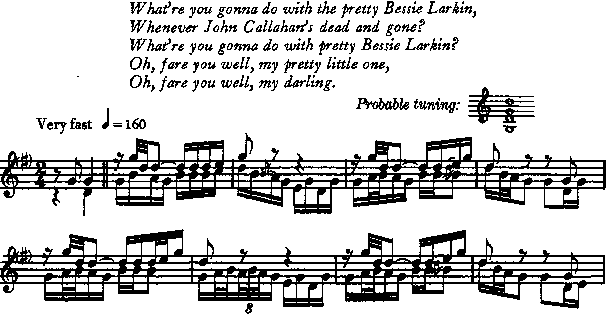
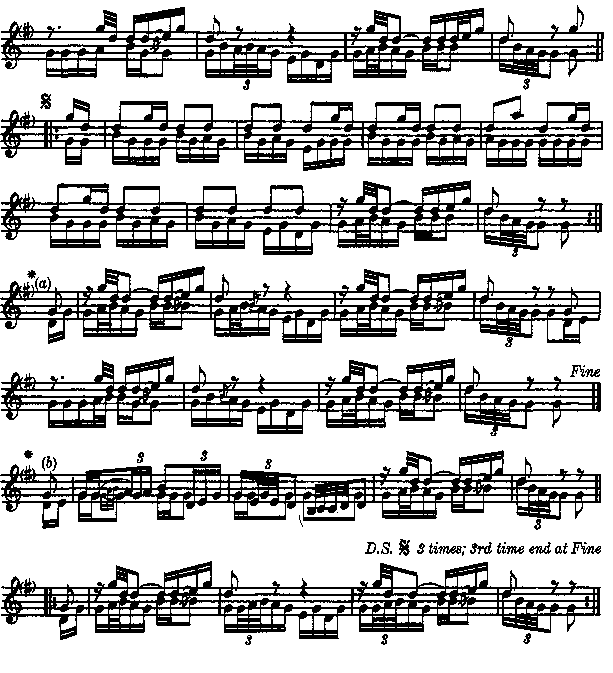
-----------------------------------------------------------------------
[Listen: Hop Light Ladies by NLCR]
HOP UP, MY LADIES
No. 1363. Acc. on guitar and banjo and sung by Fields and Wade Ward, Galax, Va., 1937. Other titles: "Hop Light, Ladies," "Miss McCloud's Reel."
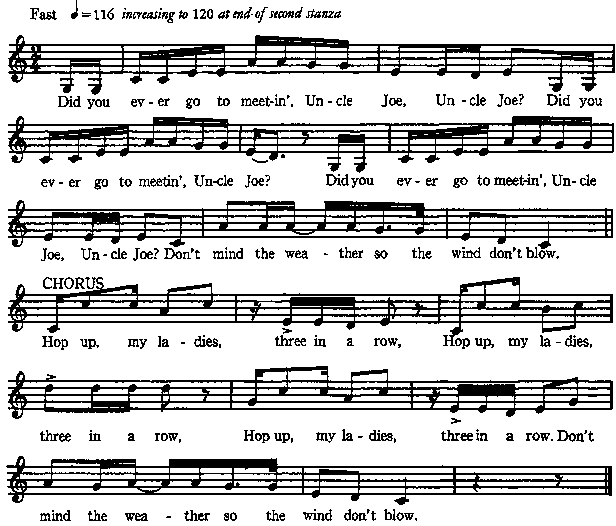
1. Did you ever go to meeting Uncle Joe, Uncle Joe?
Did you ever go to meetin', Uncle Joe?
Did you ever go to meetin', Uncle Joe, Uncle Joe?
Don't mind the weather so the wind don't blow.
Chorus: Hop up, my ladies, three in a row, (3)
Don't mind the weather so the wind don't blow.
2 Will your horse carry double, Uncle Joe, Uncle Joe?
3 Is your horse a single-footer, Uncle Joe, Uncle Joe?
4 Would you rather own a pacer, Uncle Joe, Uncle Joe?
5 Say, you don't want to gallop,
6 Say, you might take a tumble,
7 Well, we'll get there soon as t'others,
DUCKS IN THE MILLPOND
No. 1370. Acc. on guitar and sung- by Fields Ward, Galax, Va., 1937. Related to "Old Dan Tucker."
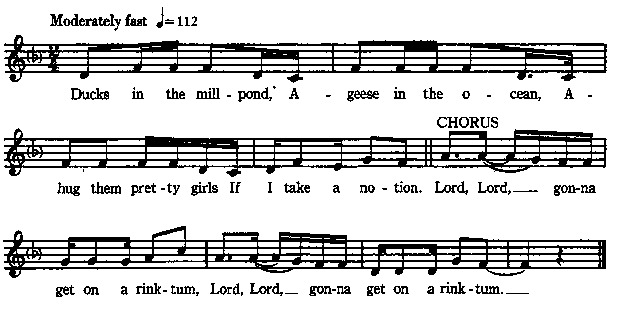
1. Ducks in the millpond,
A-geese in the ocean,
A-hug them pretty girls
If I take a notion.
2. Ducks in the millpond,
A-geese in the clover,
A-jumped in the bed,
And the bed turned over.
Chorus: Lord, Lord, gonna get on a rinktum,
Lord, Lord, gonna get on a rinktum.
3. Ducks in the millpond,
A-geese in the clover,
A-fell in the millpond,
Wet all over.
4. Up the hickory,
Down the pine,
Tore my shirt-tail
Way up behind.
5. I looked down the road,
Saw Sal a-comin,
Thought to my soul
I'd kill myself a-runnin'.
6. Monkey in the barn'ard,
Monkey in the stable.
Monkey git your hair cut
Soon as you are able.
7. Had a little pony,
His name was Jack;
Put him in a stable,
And he jumped through a crack.
8. Chew my terbacker
And spit my juice,
Want to go to heaven,
But it ain't no use.
[* Stanzas 4-8 from Ray Wood (Raywood, Texas), Mother Goose of the Ozarks. ]
----------------------------------------------------------------
LYNCHBURG TOWN
(A Banjo Tune) acc. on banjo and sung by James Mullins; Florress, KY 1937. See Whi p. 157, 178
[* Choruses 1 and 2 are sung before each stanza. Stanzas are sung to the tune of either chorus.]
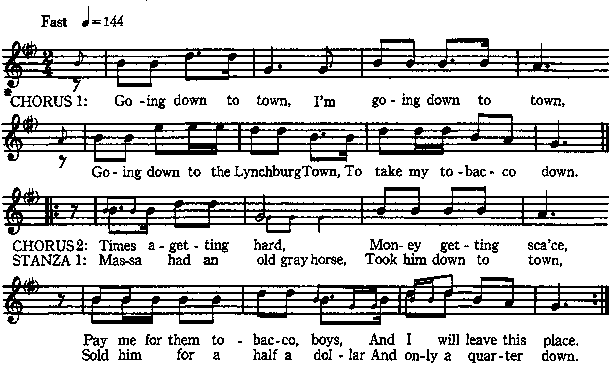
Chorus 1: Going down to town,
I'm going down to town.
Going down to the Lynchburg Town,
To take my tobacco down.
Chorus 2: Times a-getting hard,
Money getting sca'ce,
Pay me for them tobacco, boys,
And I will leave this place.
1. Massa had an old gray horse,
Took him down to town,
Sold him for a half a dollar
And only a quarter down.
2 Old massa had a brand-new coat
And he hung it on the wall,
A nigger stole old massa's coat
And wore it to the ball.
3 Old massa to the sheriff wrote
And sent it by the mail,
Mr. Sheriff got old massa's note
And put the thief in jail.
4 Old massa had a big brick house,
'Twas sixteen stories high,
And every story in that house
Was full of chicken pie.
5 Old massa was a rich old man
He was richer than a king.
He made me beat the old tin pan
While Sary Jane would sing.
6 Old massa bought a yaller gal,
He fotch her from the South,
Her hair was wrapped so very tight
That she couldn't shut her mouth.
7 Massa had an old black hen.
She laid behind the door.
Every day she laid three eggs
And Sunday she laid more.
8 Massa had an old coon dog
And he was a half a hound,
He could run for an hour and a half
And never touch the ground.
9 Somebody's stole my old coon dog,
I wish they'd bring him back;
He run the old ones over the fence
And the little ones through the crack.
10. I went down to town
And went into the store,
And every pretty girl in that town
Came running to the door.
11 Last time I saw my girl,
She was standing in the door,
Her shoes and stockings in her hand
And her feet all over the floor.
12 I went down to town
To get me a jug of wine,
They tied me up to a whipping post
And give me forty-nine.
13 I went down to town
To get me a jug of gin,
They tied me up to a whipping post
And give me hell agin.
-------------------------------------------------------
[This is an important version connecting "Jinny/Jenny Get Around" with "Sugar Hill" through the lyrics to Chorus 2 (below). If the information supplied to Lomax is correct, this dates both songs back to 1841. Although Yeats traces Sugar Hill to the minstrel song, "Long Tail Blue" there is little text evidence to support the connection with Sugar Hill. Yeats also mentions that Sugar Hill and Jenny Get Around are related (See: Far in the Mountains- song notes- Michael Yeats)--Matteson 2011]
JINNY GIT AROUND (A banjo tune)
Acc. on banjo and sung by James Mullins, Florress, Ky., 1937.
[* The banjo interludes occur between chorus 2 and each succeeding stanza. The form of the song would appear, therefore, to be "stanza, chorus 1, chorus 2," in spite of the fact the song begins with chorus 1.] [* Stanzas 4 and 5 from B. A. Botkin, The American Play-Party Song, p. 233, stanzas 6-9, from manuscript sent to John A. Lomax thirty years ago. This version is entitled "Old John Tyler" and gives 1841 as the date of the song.]
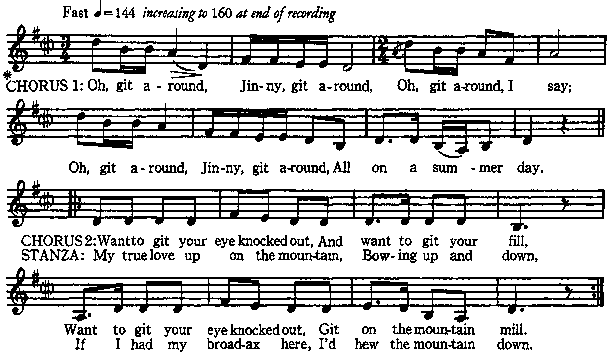
Chorus 1: Oh, git around, Jinny, git around,
Oh, git around, I say.
Oh, git around, Jinny, git around,
All on a summer day.
Chorus 2: Want to git your eye knocked out,
And want to git your fill,
Want to git your eye knocked out,
Git on the mountain mill.
1 My true love up on the mountain,
Bowing up and down,
If I had my broadax here,
I'd hew the mountain down. (Chorus 1 and 2.)
2. Jaybird up in the acorn tree,
Shaking acorns down.
My true love in the sugar tree,
Shakin' sugar down. (Chorus 1 and 2.)
3 Sixteen horses to my carriage,
Drive Jenn down to town;
Almost break my dovey's heart
To see me hold 'em down. {Chorus 1 and 2.)
4 Built me house in Baltimore,
Sixteen stories high,
Every story in my house
Filled with chicken pie. {Chorus 1.)
5 Sing on the mountain hill,
Sing on the mountain hill.
Sing on the mountain hill, my love,
I will have my fun.
6 I'm goin' up on Grabble Dick,
I'm goin' up next Friday,
I'm goin' up on Grabble Dick
And marry Miss Betsy, Friday.
7 I will have my fun, my love,
I will have my fun,
Take my glass away from me,
I don't want no more. {Chorus 2.)
8 Jaybird pull a two-ox load,
Sparrow, why not you?
My legs so long and slender, love,
I'm feared I'll pull in two.
9 Feared I'll pull in two, my love,
Feared I'll pull in two,
Feared I'll pull in two, my love,
Feared I'll pull in two.
10 Snowbird died with whooping cough,
Crawfish died with colic,
Jaybird died with a sick headache,
Inquiring the way to the frolic. (Chorus i and 2.)
11 When I git one dram,
Then I want two.
When I get on a high lonesome
I don't care what I do. (Chorus 1 and 2.)
KING WILLIAM WAS KING GEORGE'S SON*
No. 1365. Mr. and Mrs. Crockett Ward, Galax, Va., 1937. See Bot, p. 227. [For directions, see Botkin's American Play-Party Songs; p. 57]
"It was mostly skippin' and swingin' each other around in those days, not this hug gin'-up business like today. Of course the play parties was used a lot for courting you might say; but so was the Sunday singings and camp meetin'sy too, for that matter. When you get young people together they's goin' to be courtin'. Now I think a play party's a pretty good place for young folks to find out about each othery how they can get along with peopley and if a girl's got any life about hery anything about her to like besides her looks. And a slicked-up boy now—many a girl's found out how little sense such a boy has got when she sees him alongside a bunch o' right clever fellers; or, maybe she's been a-holdin' his good looks against him, and she finds out he's got more sense than she thought he had and can hold with the smartest of 'em. There ain't no harm in a decent-conducted play party or singin' party, as I can see."
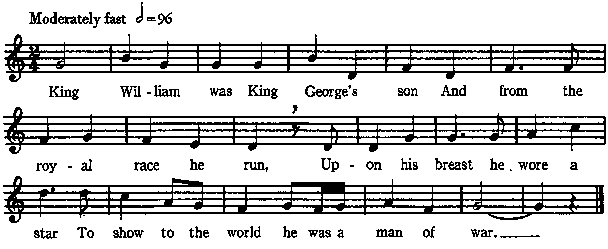
1. King William was King George's son
And from the royal race he run,
Upon his breast he wore a star
To show to the world he was a man of war.
2. Go choose you East, go choose you West,
Go choose the one that you love the best,
If she's not here to take her part
Choose you another with all your heart.
3. Down on this carpet you shall kneel,
Sure as the grass grows in the field,
Hug her neat and kiss her sweet,
Then you may rise upon your feet.
HAD A LITTLE FIGHT IN MEXICO
No. 1351. Mrs. Carlos Gallimore and her sons. Dale and Gene, Galax, Va., 1937. See Bot, p. 232.
Directions: Couples line up and promenade through the first stanza and chorus. The girls pause at the second stanza, while the boys go forward, thus changing partners. The third stanza is dramatized in greeting the new partner. Stanzas 2 and 3 are inserted at the will of any couple who can get a following of voices.
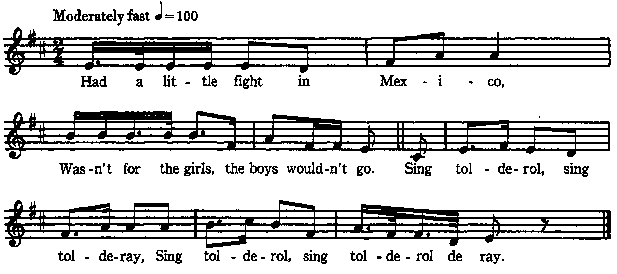
1. Had a little fight in Mexico,
Wasn't for the girls, the boys wouldn't go.
Chorus:
Sing tol-de-rol, sing tol-de-ray.
Sing tol-de-rol, sing tol-de-rol-de-ray.
2 Come to the place where the blood was shed,
The girls turned back and the boys went ahead.
3 And the girls and the boys where they did meet,
They laughed and talked and kissed so sweet.
4 You better get up, you're mighty in the way,
Choose you a partner and come along and play.
5 Oh, that little fight in Mexico,
None was killed but John Taylor-o.
6 I had an old hat with a flop-down brim,
It looked like a toad frog settin' on a limb.
7 I had an old cow and I milked her in a gourd,
Set it in a corner and covered it with a board.
8 I want to go to Texas, and to Texas I'll go,
And I'll vote for old John Tyler-o.
9 I went to the fight in Mexico,
Fightin' for the gunboats all in a row.
Repeat stanzas 2, 3, 4.
-------------------------------------------------------
THE BANK OF THE ARKANSAW
No. 1337. Mrs. Minta Morgan, Bells, Texas, 1937. See Lo 2, p. 261.
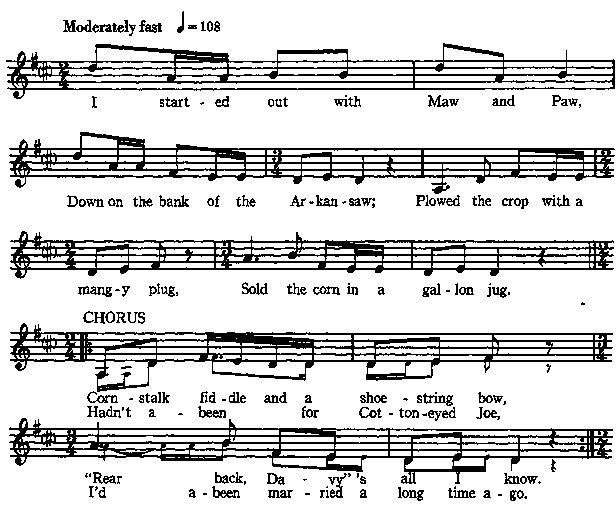
1. I started out with Maw and Paw,
Down on the bank of the Arkansaw;
Plowed the crop with a mangy plug.
Sold the corn in a gallon jug.
Chorus:
Cornstalk fiddle, and a shoestring bow,
"Rear back, Davy," all I know.
Hadn't a-been for Cotton-eyed Joe,
I'd a-been married a long time ago.
2 Two little Indians and one old squaw,
Settin' on the bank of the Arkansaw;
Never put out a hook and line,
Steal all the big fish off of mine.
3 Prettiest little girl I ever saw,
Lived on the bank of the Arkansaw;
Eyes were blue and her cheeks were red,
She was sweet as gingerbread.
4 Mustang grape and the sweet pawpaw
Grow on the bank of the Arkansaw;
Every time a pretty girl wanted a beau,
Up jumped Jimmy and away went Joe.
5 My best girl is hard to please,
My best pants were up to my knees,
I got the first good pair I saw
Laying on the bank of the Arkansaw.
6 Jackson pushed his mother-in-law
Over the bank of the Arkansaw.
The old lady showed him how to swim—
When she got out, she threw him in.
7 The old lady ran away with the law,
Down on the bank of the Arkansaw;
Fell in love with the popinjay,
They'll be back about dinnertime o' day.